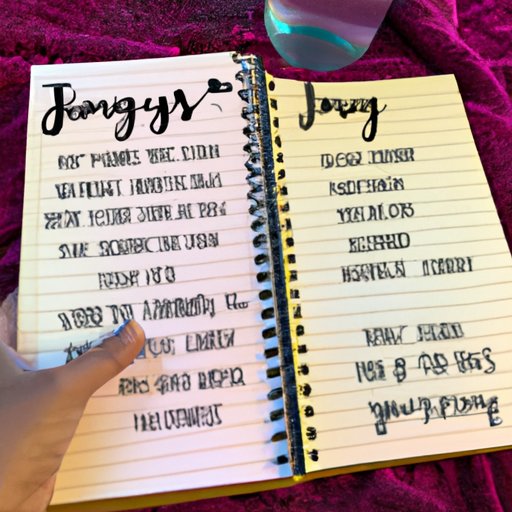Introduction
Journaling is an excellent way to record your thoughts and feelings, gain clarity on difficult decisions, and explore your creativity. It’s a powerful tool for self-reflection and personal growth that anyone can do in just a few minutes each day.
According to a study from the University of Rochester Medical Center, journaling can help improve your physical and mental health. The study found that writing about emotional experiences can reduce stress, improve mood, and even boost immune system functioning.

Setting Aside a Dedicated Time and Place for Journaling
One of the best ways to make sure you stick with your journaling practice is to create a dedicated time and place for it. That could be first thing in the morning, right before bed, or any other consistent time that works for you.
Creating a Schedule
The key to making journaling a habit is to establish a regular routine. Figure out a time that works for you and set reminders so that you don’t forget to write. If you need a little extra motivation, consider setting a goal for yourself, such as writing every day for a week or month.
Choosing a Location
The environment you are in can also influence your journaling experience. Choose a quiet spot where you feel comfortable and relaxed. This could be your bedroom, a cozy corner of your living room, or even a nearby park. Make sure to pick a place that allows you to focus and be creative.
Generating Topics or Questions to Explore
Once you have a dedicated time and space for your journaling sessions, the next step is to come up with topics or questions to explore. You don’t need to plan ahead—just start writing and see what comes out. Here are some ideas to get you started:
Reflection on the Day’s Events, Emotions, and Experiences
Take a few minutes to reflect on your day. Write down anything that stood out to you, whether it was a moment of joy, frustration, or something else entirely. What did you learn? How did it make you feel?
Writing Down Current Thoughts and Feelings
Sometimes it can be helpful to simply let your thoughts and feelings flow onto the page. Take a few moments to write down whatever comes to mind. Don’t worry about having a cohesive story—just jot down whatever comes to mind.
Setting an Intention for Your Journaling Session
Before you start writing, take a few moments to set an intention for your journaling session. Ask yourself what you hope to accomplish during this time. Do you want to process your emotions? Brainstorm new ideas? Reflect on a recent event? Setting an intention can help you stay focused and get the most out of your journaling session.

Taking Advantage of Writing Prompts
If you’re feeling stuck or uninspired, writing prompts can be a great way to get your creative juices flowing. They can also help you explore different topics and look at things from a new perspective.
Finding Writing Prompts
There are plenty of sources for writing prompts online, including websites, books, and even apps. Do a quick search to find prompts that spark your interest. You can also check out magazines, newspapers, and other publications for interesting articles or stories that might inspire you.
Types of Writing Prompts
Writing prompts can take many forms. Some might be open-ended questions, while others may be more specific scenarios or situations. Some prompts might ask you to reflect on a particular experience, while others might encourage you to think of a story or poem. Experiment with different types of prompts to find what works best for you.
Conclusion
Journaling is a great way to express yourself, process your thoughts and feelings, and explore your creativity. To get the most out of your journaling practice, set aside a dedicated time and place for it, come up with topics or questions to explore, and take advantage of writing prompts. With a little bit of dedication and creativity, you’ll be well on your way to becoming a better journaler.
As psychologist James Pennebaker said, “By forcing people to slow down and reflect on their lives, they can gain insight into themselves and the world around them.” So grab a pen and paper and start exploring!
Title
(Note: Is this article not meeting your expectations? Do you have knowledge or insights to share? Unlock new opportunities and expand your reach by joining our authors team. Click Registration to join us and share your expertise with our readers.)
